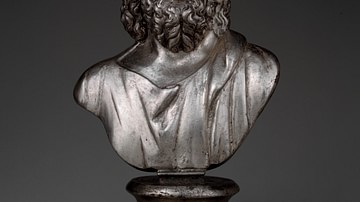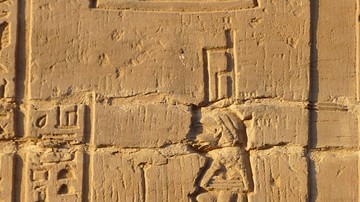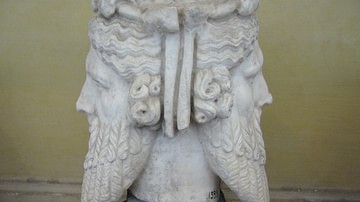Search
Search Results

Article
Color in Ancient Egypt
The ancient Egyptians had a great appreciation for life which is clearly depicted through their art. Images of people enjoying themselves - whether in this life or the next - are as plentiful as those most often seen of the gods or funerary...

Article
Cultural & Theological Background of Mummification in Egypt
Many myths and falsehoods concerning the Egyptian practice of mummification have been promoted to the general public in movies, television shows, and documentaries. While these offerings are entertaining and fascinating to watch, the purposes...

Definition
Ptolemaic Dynasty
The Ptolemaic dynasty was a Macedonian royal family that ruled Ptolemaic Egypt from 323 to 30 BCE. It was founded by Ptolemy I, a general and successor of Alexander the Great. They built Alexandria, including the Lighthouse of Alexandria...

Definition
Serapis
Serapis is a Graeco-Egyptian god of the Ptolemaic Period (323-30 BCE) of Egypt developed by the monarch Ptolemy I Soter (r. 305-282 BCE) as part of his vision to unite his Egyptian and Greek subjects. Serapis’ cult later spread throughout...

Definition
Horus
Horus is the name of a sky god in ancient Egyptian mythology which designates primarily two deities: Horus the Elder (or Horus the Great), the last born of the first five original gods, and Horus the Younger, the son of Osiris and Isis...

Definition
Ghosts in Ancient Egypt
A text known as The Lay of the Harper, dating from the Middle Kingdom (2040-1782 BCE) encourages its audience to make the most of the time because death is a certainty: Make a holiday! And do not tire of playing! For no one is allowed to...

Article
Egyptian Medical Treatments
The ancient Egyptians experienced the same wide array of disease that people do in the present day, but unlike most people in the modern era, they attributed the experience to supernatural causes. The common cold, for example, was prevalent...

Article
Ancient Egyptian Medical Texts
Medicine in ancient Egypt was understood as a combination of practical technique and magical incantation and ritual. Although physical injury was usually addressed pragmatically through bandages, splints, and salves, even the broken bones...

Image Gallery
Gods & Goddesses of Rebirth & Renewal Around the World
Deities representing the concepts of rebirth and renewal have been a vital aspect of the human condition for thousands of years. Early animistic belief systems venerated the sun, which later became associated with powerful deities, such as...

Definition
Egyptian Faience
Egyptian faience is a glassy substance manufactured expertly by the ancient Egyptians. The process was first developed in Mesopotamia, first at Ur and later at Babylon, with significant results but faience production reached its height of...